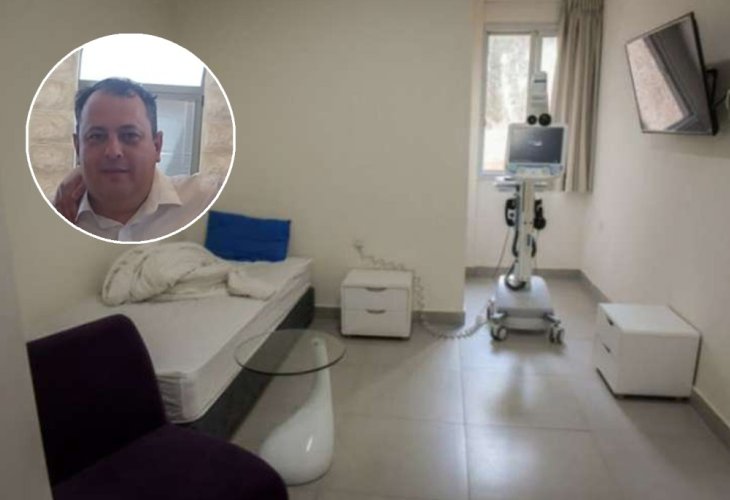The Man Enforcing Quarantine in Israel: "This Is How We Catch Quarantine Violators"
Dr. Roni Berkowitz from the Ministry of Health is confident that the main way to overcome the coronavirus crisis is through strict isolation of exposed individuals. How does he ensure enforcement, and what is the role of the teams visiting homes?
 Isolation room at Sheba Medical Center (Photo: Avshalom Shoshani, Flash 90). In the circle: Dr. Roni Berkowitz
Isolation room at Sheba Medical Center (Photo: Avshalom Shoshani, Flash 90). In the circle: Dr. Roni BerkowitzIf you've seen Ministry of Health officials passing through your neighborhood, accompanied by stern police officers equipped with appropriate protective gear on their way to yet another surprise home visit, you might have been alarmed. After all, it's not a sight you see every day, and it can seem quite intimidating.
But those who should truly be worried are the quarantine violators acting against the law and who will be held accountable. As Dr. Roni Berkowitz, head of the Enforcement and Supervision Division at the Ministry of Health, points out, the ministry is currently increasing enforcement efforts to ensure that every Israeli citizen required to be in home isolation due to exposure to a coronavirus patient or after returning from abroad indeed complies with the rules and does not take them lightly.
 Dr. Roni Berkowitz
Dr. Roni Berkowitz
The Goal: "Not to Leave the House"
"I can say that the adherence to home quarantine today is better than it was a few weeks ago," he notes at the beginning of his remarks. "As it seems to us, the vast majority of people required to be in isolation are genuinely complying. I estimate that between 80% to 90% are not trying to evade and are truly in complete isolation. That's good, but it's not enough, because if we want to stop the virus, we must ensure that all Israelis required to be in isolation do so thoroughly and take full responsibility. We are using all the tools at our disposal, and every day we conduct home visits to the quarantined to ensure they are fulfilling their obligations."
How do you know which citizens are supposed to be in quarantine?
"We perform most home visits after receiving reports of 'quarantine violators.' Neighbors or family members submit these reports through an anonymous hotline we opened on the ministry's website. People send messages complaining about those who violated quarantine, and we make sure to visit their homes to check if it's true. So far, we've received over 3000 such reports. Also, we receive reports from the police, which operate with a sophisticated cyber system capable of identifying those who should be in quarantine and tracking them. The basic information on those needing quarantine is obtained by the police from the Population Authority, so they know precisely who landed from abroad and therefore should be in isolation. They have additional sources, making everything transparent and known."
So you just go to the homes and knock on the doors?
"We operate on several fronts – primarily, we conduct a lot of phone calls to people to verify they're fulfilling their duties, and simultaneously, we perform surprise home visits to ensure the quarantines are being observed. We conduct these visits alongside police teams. Our sole purpose is to verify that the individual who should be isolated is at home. Beyond that, we don't check if they're confined to a room or maintaining sufficient distance from family members, as that's a personal matter. The main thing is not to endanger the public."
 (Photo: Shutterstock)
(Photo: Shutterstock)
A Criminal Offense
Dr. Berkowitz emphasizes that initially, they don't even knock on doors but are content with a phone call. "If they answer the phone, we ask them to step out onto the balcony or window and identify themselves with an ID card. That's enough for us to ensure their presence at home. If there's no answer, we ring the intercom, and if there's still no answer, we knock on the door. Of course, at this stage, we are already fully equipped with gear from head to toe, including masks. Once they open the door, we maintain a two-meter distance and ask them to identify themselves."
What happens if there's no answer at home, suggesting they're likely not there?
"In cases where the quarantine order is violated," says Dr. Berkowitz, "we first ensure to locate the individual in question and make sure they return home immediately, as the citizens' safety is our top priority. After that, the police are authorized to exercise their full powers against them, just like in any other criminal offense. So far, more than 40 criminal cases have been opened against quarantine violators. The maximum penalty according to law is seven years in prison for 'spreading disease,' and recently administrative fines of 5000 shekels have been added. By the way, it has happened more than once that we arrived at the house of a person who should have been isolated, and they weren't there, but when we continued to their workplace, we found them working. This is a very problematic issue that endangers others."
And finally, Dr. Berkowitz issues a clear instruction: "People must understand that quarantine is not just for protocol or recommendation, but it saves lives. Every COVID-19 infection always begins with two weeks of incubation, during which the patient doesn't feel any symptoms, which only manifest later. We must do everything to ensure that Israel does not reach a severe situation like in other countries, and things must remain under control. Therefore, our call to the public is: adhere to quarantine measures, even if they seem drastic. If you have even the slightest concern of contact with a COVID-19 patient, immediately enter home isolation and do not breach it, for your own sake and for the sake of public health."

